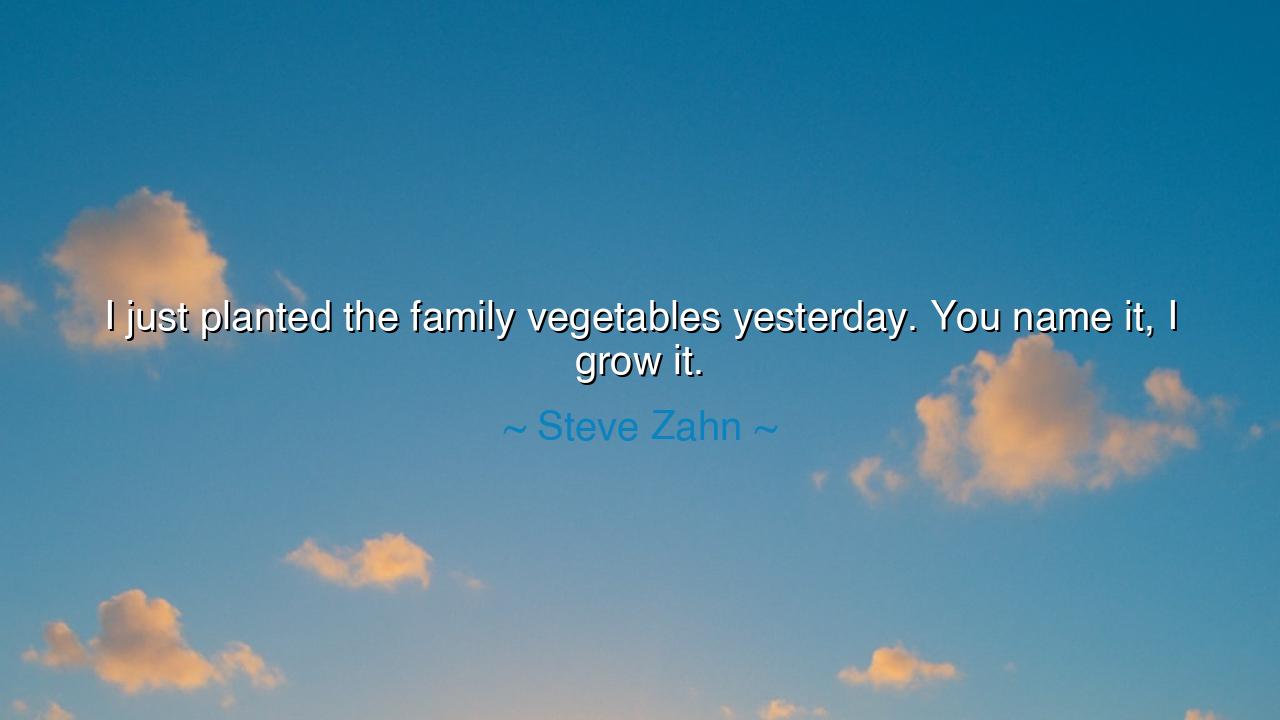
I just planted the family vegetables yesterday. You name it, I






“I just planted the family vegetables yesterday. You name it, I grow it.” Thus spoke Steve Zahn, the actor known for his warmth and humor, revealing a truth that stretches far beyond the soil and the seed. Beneath these simple words lies the eternal story of care, labor, and legacy — the timeless human act of planting for others. To plant the family vegetables is to bind oneself to the cycle of nourishment and continuity, to the humble and sacred work of sustaining life. Zahn’s declaration is not merely about a garden; it is a quiet hymn to responsibility, to creation, and to the joy that comes when one’s hands serve both the earth and the people one loves.
The origin of this quote lies in the life of a man who has known both the glamour of film and the grounding rhythm of rural life. Away from the cameras, Steve Zahn tends to his land in Kentucky — a farm where he raises animals, cultivates crops, and lives in balance with the seasons. His words reflect a truth often forgotten in the noise of the modern world: that fulfillment is found not in the applause of crowds, but in the harmony between human effort and nature’s quiet grace. When he says, “You name it, I grow it,” he is speaking not only of vegetables, but of abundance — the abundance that comes when one gives attention, patience, and love to the living things entrusted to one’s care.
To plant is to hope. It is an act that belongs to both the farmer and the philosopher, to the dreamer and the realist alike. The seed, small and unassuming, holds within it a promise: that with time and care, it will become sustenance. Thus, the gardener becomes a kind of priest, performing a sacred ritual of renewal. Zahn’s family garden is a living metaphor — the soil where labor becomes love, and love becomes food. It is not merely an act of provision but of faith, for no gardener knows exactly what the earth will yield. One plants because one believes — believes in tomorrow, in the rain, in the rising of green shoots after the darkness of the soil.
In the annals of history, there are many who found wisdom in this simple truth. The great Cincinnatus of Rome, once called from his plow to save his people, returned to his fields after victory, preferring the peace of his garden to the glory of the senate. To him, as to Zahn, the tending of land was not lowly labor but the essence of virtue — the mark of a life well-rooted. Even George Washington, first among the founders of America, delighted most not in politics or power, but in his farm at Mount Vernon, where he spoke of agriculture as “the most noble employment of man.” They understood what Zahn’s words echo: that to grow things is to engage directly with life’s divine rhythm — the sowing, the waiting, the harvest — and to take part in the sacred stewardship of the earth.
And what does it mean to grow “family vegetables”? It means to work not for oneself alone, but for others — for children, for kin, for the shared table. In this, Zahn’s statement speaks to the heart of selflessness. He plants so that others may eat, so that his family may flourish. This is the law of love written into the soil: that we labor, and another reaps; that we give, and others grow strong. The family garden, in this way, becomes a symbol of continuity, of passing down care through generations. It is the same love that built civilizations, that inspired mothers to bake bread and fathers to till the ground — the love that says, “I will provide, I will sustain, I will nurture what will outlive me.”
There is also a quiet heroism in these words. In a world that values speed and spectacle, the act of planting and tending is a rebellion of patience. To cultivate the earth is to reject the instant and to embrace the eternal. Zahn’s simple statement becomes an emblem of resistance against shallowness — a call to slow down, to touch the real, to get one’s hands dirty. The soil teaches humility, for it reminds us that all things — fame, wealth, even the body itself — return to dust. But it also teaches resurrection: for from that same dust, life rises anew.
Therefore, my child, take heed of Steve Zahn’s lesson. Learn to plant — whether it be vegetables, virtues, or visions. Cultivate what is good and necessary. Give your hands to labor, your heart to patience, and your soul to service. When you plant, do not think only of what you will harvest, but of those who will be nourished by your work. Let your garden — whatever its form — be a place where love takes root and life grows strong.
For in the end, to say “I grow things” is to declare oneself alive, aligned with the eternal rhythm of creation. To tend the soil is to join the chorus of all who have come before — those who fed their families, healed the land, and found meaning in the patient work of growth. So plant, and keep planting, until your hands are worn and your heart is full. For the gardener’s reward is not merely in the harvest, but in the knowing that, for a brief and shining moment, he has worked side by side with the Creator.






AAdministratorAdministrator
Welcome, honored guests. Please leave a comment, we will respond soon